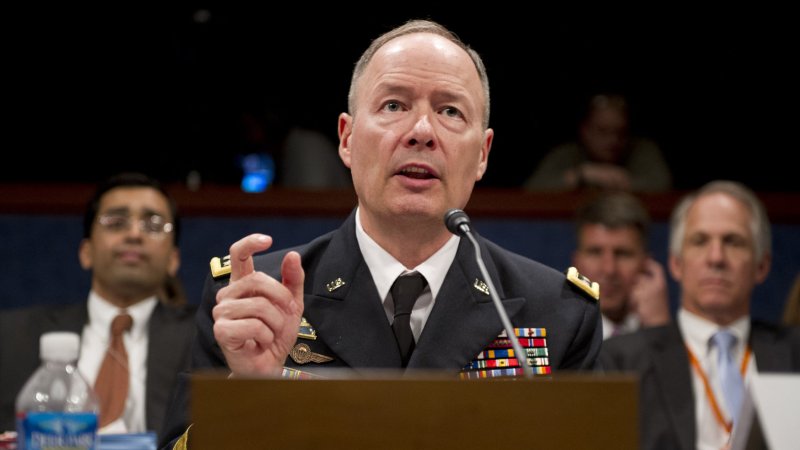1 of 4 | Army Gen. Keith Alexander, Director of the National Security Agency, testifies during a House Select Intelligence Committee hearing on NSA programs designed to protect Americans, on Capitol Hill in Washington, June 18, 2013. UPI/Kevin Dietsch |
License Photo
WASHINGTON, June 18 (UPI) -- Dozen of plots against U.S. and foreign targets have been thwarted by analyzing secretly obtained telephone data, intelligence officials said Tuesday.
The revelations were made to members of the House Intelligence Committee by National Security Agency director Gen. Keith Alexander and Sean Joyce, deputy FBI director, CNN reported.
In disclosing previously classified information, Alexander said more than 50 planned terrorist attacks have been uncovered by a controversial telephone surveillance program. Attacks against the New York subway system and the New York Stock Exchange were among the plots that were stopped, he said.
Joyce said the programs had also uncovered a plan to attack the office of a Danish newspaper that had published a cartoon of the Prophet Mohammed.
Defending the programs, Alexander said, they in combination with other intelligence "have protected the U.S. and our allies from terrorist threats across the globe," The Washington Post reported.
Intelligence officials are trying to determine if court opinions on NSA requests for phone and telephone intelligence surveillance can be released, Robert Litt, general counsel for the Office of the Director of National Intelligence, told the committee.
President Barack Obama has said he will meet with a new privacy oversight board to discuss balancing U.S. surveillance needs with people's rights to privacy.
He also said he ordered surveillance documents declassified so the public can see the controversial, big brother-like surveillance programs in a broader context.
"What I've asked the intelligence community to do is see how much of this we can declassify without further compromising the program, No. 1," he told the Public Broadcasting Service program "Charlie Rose" in an interview recorded Sunday and broadcast Monday night.
The intelligence community is "in the process of doing so now," Obama said.
"No. 2, I've set up a privacy and civil liberties oversight board made up of independent citizens, including some fierce civil libertarians," he said.
"I'll be meeting with them. And what I want to do is to set up and structure a national conversation, not only about these two programs, but also the general problem of data, big data sets, because this is not going to be restricted to government entities," Obama said in his first public comments since June 7 about leaked National Security Agency surveillance documents pointing to the government's collection of untold millions of records from U.S. telecommunications firms and Internet companies in the name of preventing terrorism.
"The way I view it, my job is both to protect the American people and to protect the American way of life, which includes our privacy," he said.
He called the need to sacrifice freedom for security "a false choice."
"That doesn't mean that there are not trade-offs involved in any given program, in any given action that we take," he added, pointing out air travelers go through airport security checks today that didn't exist "when we were growing up."
"To say there's a trade-off doesn't mean somehow that we've abandoned freedom," he said, adding his job was to "make sure that we're making the right trade-offs."
Obama also insisted "unequivocally" the NSA was not categorically listening to Americans' phone calls or reading Americans' emails.
"So point No. 1: If you're a U.S. person, then NSA is not listening to your phone calls and it's not targeting your emails unless it's getting an individualized court order. That's the existing rule," Obama said.
His remarks differed greatly from those of rogue ex-contractor Edward Snowden, the confessed leaker of the NSA documents, who is in hiding but answered questions in an online chat on the website of British newspaper The Guardian Monday.
"Americans' communications are collected and viewed on a daily basis on the certification of an analyst rather than a warrant," Snowden wrote.
"They excuse this as 'incidental' collection, but at the end of the day, someone at NSA still has the content of your communications," he wrote. "Even in the event of 'warranted' intercept, it's important to understand the intelligence community doesn't always deal with what you would consider a 'real' warrant like a police department would have to, the 'warrant' is more of a templated form they fill out and send to a reliable judge with a rubber stamp."
U.S. intelligence officials did not immediately respond to Snowden's statements. But former NSA officials rejected his portrayal, telling the Los Angeles Times the agency followed strict procedures to keep private any names of Americans caught up in monitoring efforts aimed at foreign terrorists. The agency also sharply limited who could see the data, the former officials said.
Obama said the surveillance was subject to a system of "checks and balances," with the U.S. Foreign Intelligence Surveillance Court and Congress overseeing surveillance authorizations.















